Adult Missionary Kids & Mental Health
Tanya Crossman and Carmen Doerwald
This series of articles provides data on specific sectors, drawn from our 2024 Survey: Impact of Childhood Global Mobility on Adult Wellness. The research connects the dots between both hardships and resilience factors in childhood with physical and emotional wellness markers in adulthood. Learn more about all our research surveys and white papers here.
We prioritize research so that...
We prioritize research so that...
- Caregivers better understand the needs of the TCKs they care for and therefore build effective programs and support systems.
- Adult TCKs feel seen in their stories, knowing they are not alone and there is hope for thriving.
Adult Missionary Kids & Mental Health:
First Look at the 2024 Research
Click on these buttons to scroll down the page to specific sections.
Conducting research is an important part of how TCK Training cares for globally mobile families. In 2024, we ran a survey of 1,643 Adult TCKs, including 1067 Missionary kids who lived abroad during childhood. This research reflected the complexity of an international upbringing, with both wonderful experiences and difficult impacts represented in the data:
91% of missionary TCKs said living abroad was a good experience overall 76% of missionary TCKS said that living abroad made their family closer 74% of missionary TCKs reported trouble belonging as an adult 69% of missionary TCKs experienced pressure to perform in their passport country 40% of missionary TCKs were diagnosed with depression
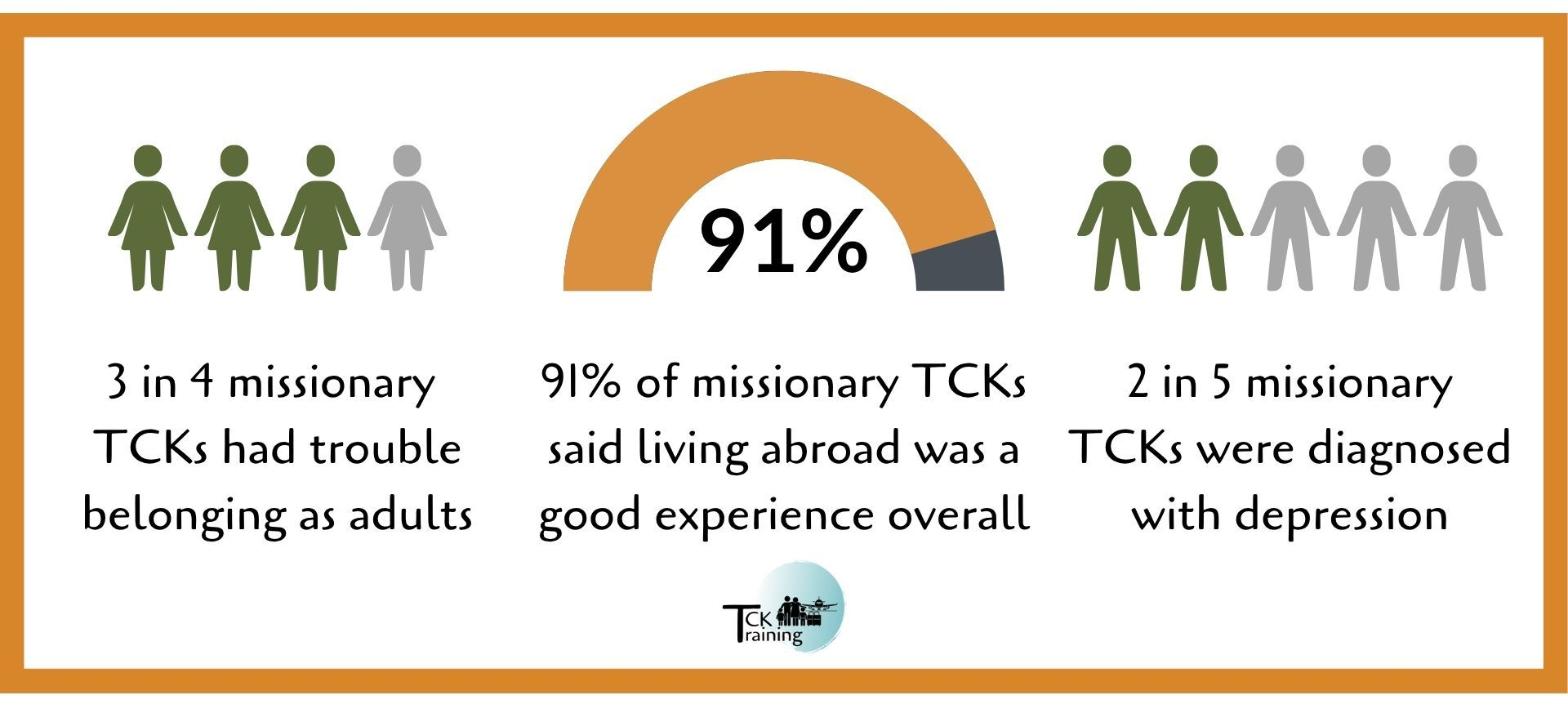
In this blog post, we review data from our latest research (First Look: Data from the 2024 Survey on the Impact of Childhood Global Mobility on Adult Wellness) that applies specifically to missionary kids who lived abroad during childhood (TCKs). We hope to see this research used to support the well-being of missionary TCKs globally – before, during, and after their time abroad.
The research confirmed that we need to support Missionary Kids (a subcategory of TCKs), especially regarding their emotional health. Of the ACE score categories, those pertaining to Emotional Health were the most statistically significant for MKs.
Views of Childhood
Respondents were offered a list of statements and asked which reflected their own experiences of growing up as TCKs. These statements were based on common sentiments expressed during our work with hundreds of TCKs, including those we support with Unstacking Sessions. There were a lot of positive sentiments expressed, including:
19% of missionary TCKs said their experience was “mostly painful” which was similar to what we saw in other sectors. It is important to note that the majority of missionary kids also said they could see both good and hard parts in their story, and that living overseas was a good experience overall.
- 98% of missionary TCKs could see both good and hard parts in their story
- 96% of missionary TCKs said that there were hard times but enriching experiences when living abroad
- 91% of missionary TCKs reported living abroad was a good experience overall
- 76% of missionary TCKs said that living abroad made their family closer
19% of missionary TCKs said their experience was “mostly painful” which was similar to what we saw in other sectors. It is important to note that the majority of missionary kids also said they could see both good and hard parts in their story, and that living overseas was a good experience overall.
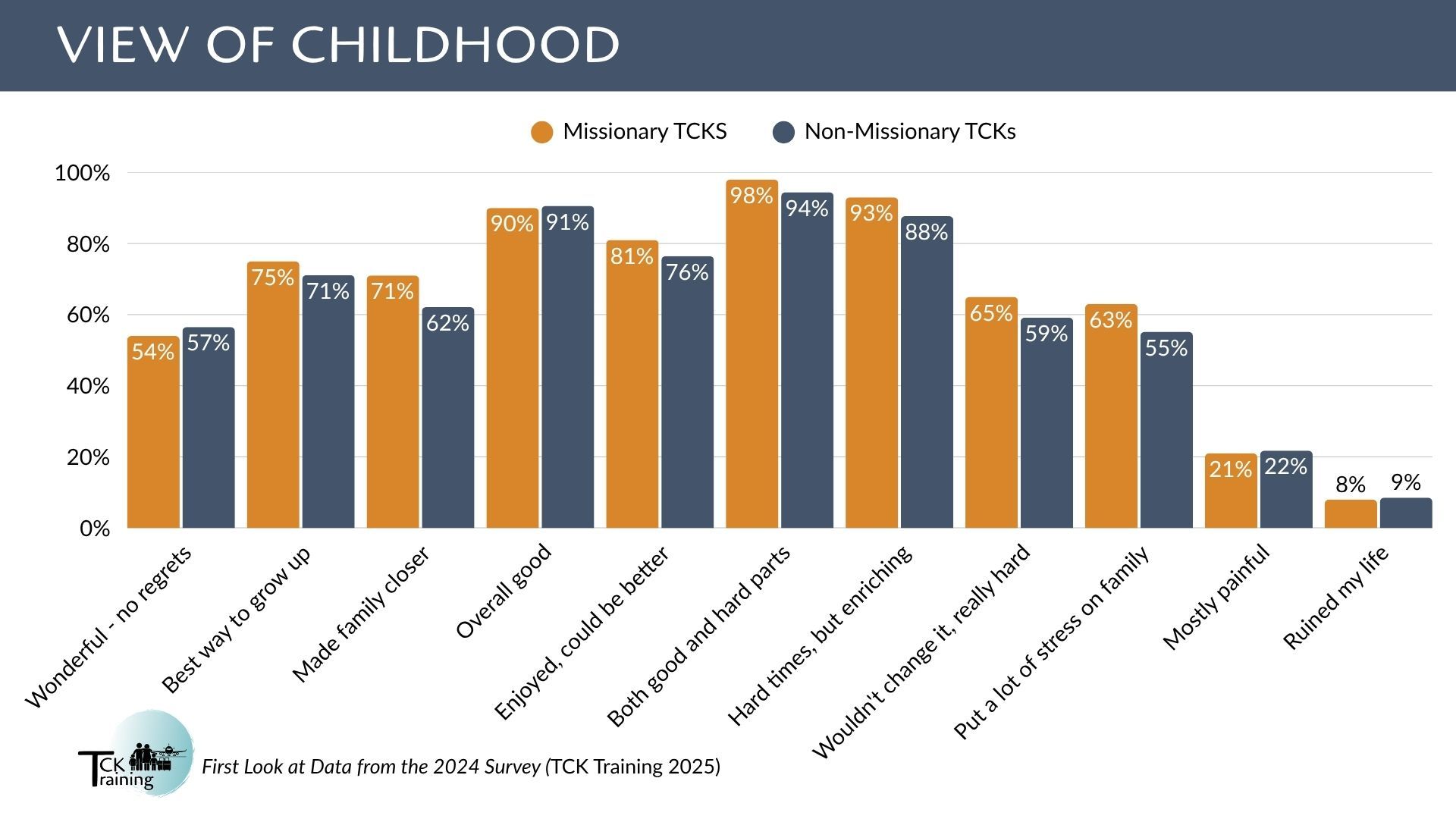
We also reviewed how parents’ occupation impacted TCKs by asking which statements they identified with as children. There seemed to be a strong connection with their parents’ occupation in comparison to other sectors. 74% of missionary TCKs felt proud of their parents' work, 73% of missionary TCKs identified with their parent’s work/ purpose, and 57% felt a desire to follow in their parents’ footsteps (each of these were more common than among non-missionary TCKs). MKs were also much less likely to say they were "indifferent" to their parents' work abroad (10%, compared to 29% of non-missionary TCKs).
On the other hand, missionary kids were also more likely to experience certain struggles than other TCKs:
On the other hand, missionary kids were also more likely to experience certain struggles than other TCKs:
- Pressure to “perform” in their passport country (69%)
- Pressure to perfect while living abroad (54%)
- Anxiety due to tasks assigned to them (27%)
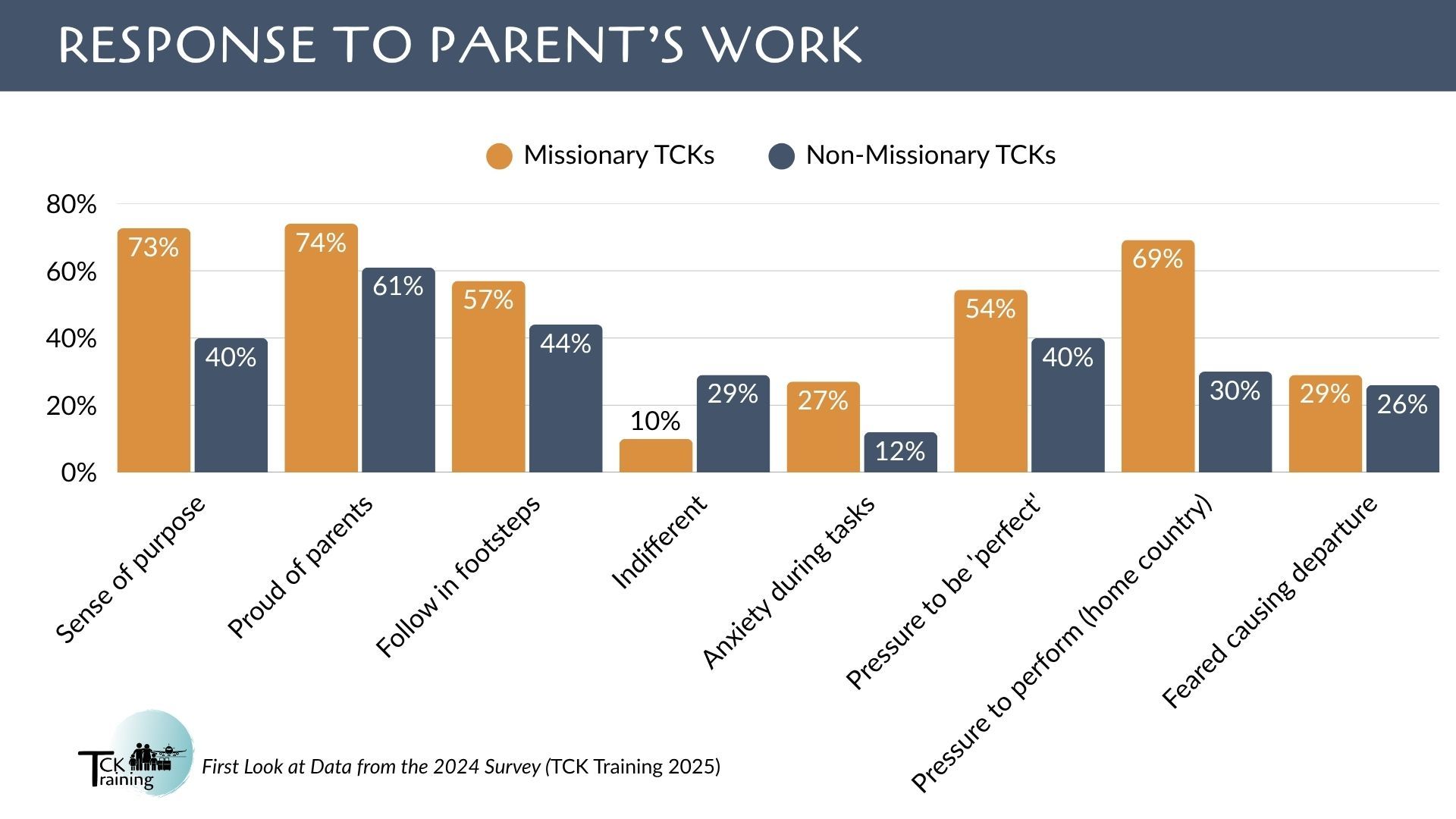
In many ways, MKs live publicly, whether they want to or not. I mean how many families in your passport country send monthly or quarterly newsletters to each other? One missionary kid confessed, “I had to be perfect so I wouldn’t mess up my dad’s ministry.” Another girl said, “Everyone thinks I’m better than them.” I asked her to clarify. She said, “They think because I’m an MK I’m more spiritual than them. They also think that I’m arrogant because they think I think I’m better than them.” It’s confusing, I know. The pressure to validate a parent’s life choices is too heavy
Strengths and Struggles in Adulthood
Drawing from our experiences working with hundreds of TCKs, we also curated lists of potential strengths and struggles that might be identified during adulthood. These were predominantly taken from things we regularly hear TCKs say when describing their experiences, but also included words and phrases that are often used to describe the TCKs life – for better or worse.
Strengths
There were many areas in which missionary TCKs saw strengths in their adult selves, such as the 93% who saw a Broad Worldview as one of their strengths. Missionary TCK's were also confident in a variety of strengths including:
- 85% of missionary TCKs identified global perspective as a strength
- 82% of missionary TCKs identified compassion as a strength
- 82% of missionary TCKs identified adaptability as a strength
- 76% of missionary TCKs identified open-mindedness as a strength
Overall, missionary kids were less likely to self-report these strengths than other TCKs. Non-missionary kids were more confident that they possessed strengths of: hope in adversity, goals and aspirations, and that they were self-motivated.
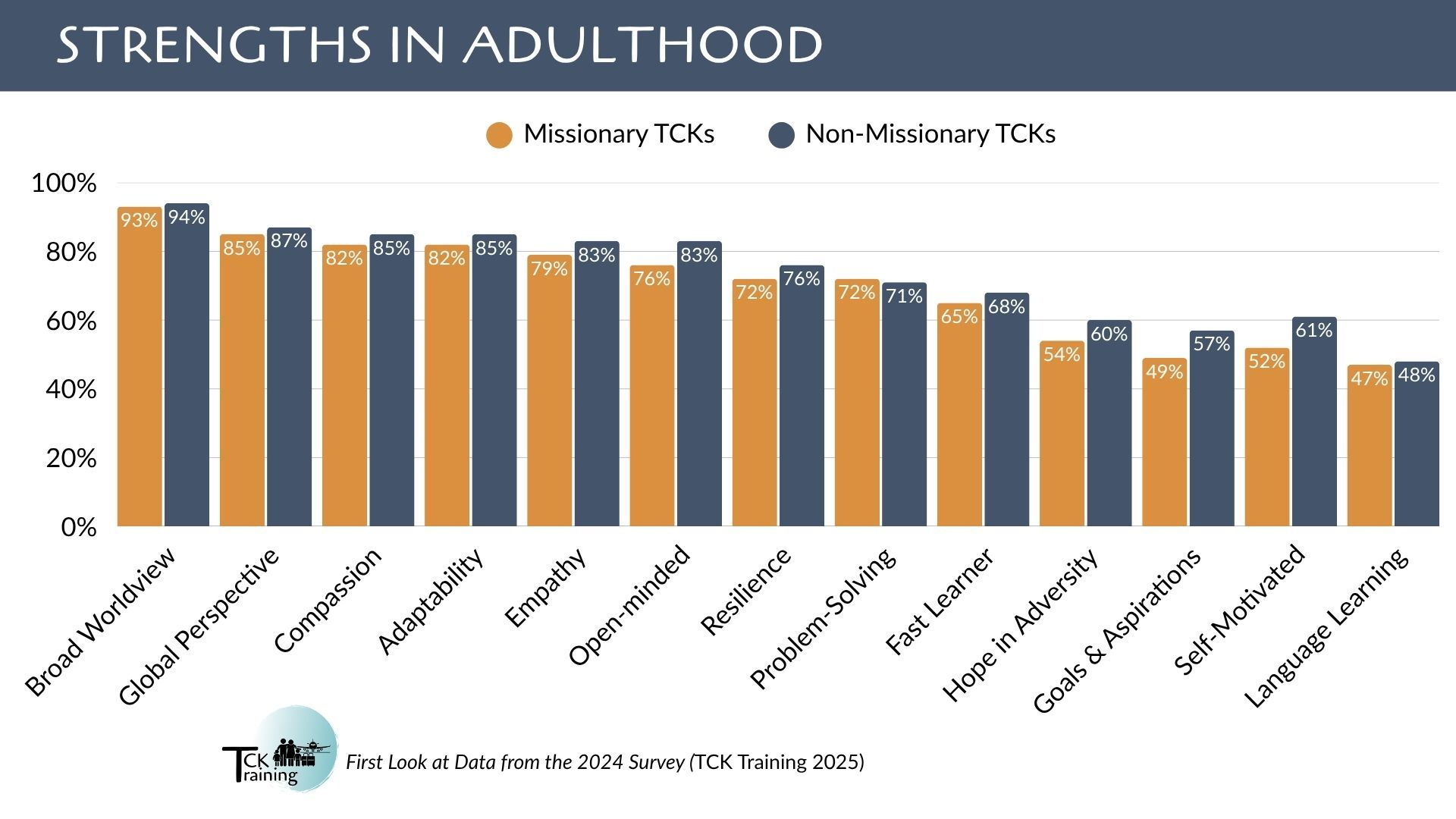
Struggles
Generally speaking, missionary TCKs identified these areas of struggle in adulthood at similar rates to other TCKs, though missionary TCKs were more likely to say they struggled with difficulty naming/understanding their own feelings, ambiguous loss, and unresolved grief.
Missionary TCKs' greatest areas of struggle included:
- 74% of missionary TCKs identified “trouble belonging” as a struggle
- 58% of missionary TCKs identified “identity uncertainty” as a struggle
- 55% of missionary TCKs identified “difficulty understanding my own feelings” as a struggle
- 51% of missionary TCKs identified with “itchy feet” as a struggle
- 49% of missionary TCKs identified with “unresolved grief” as a struggle
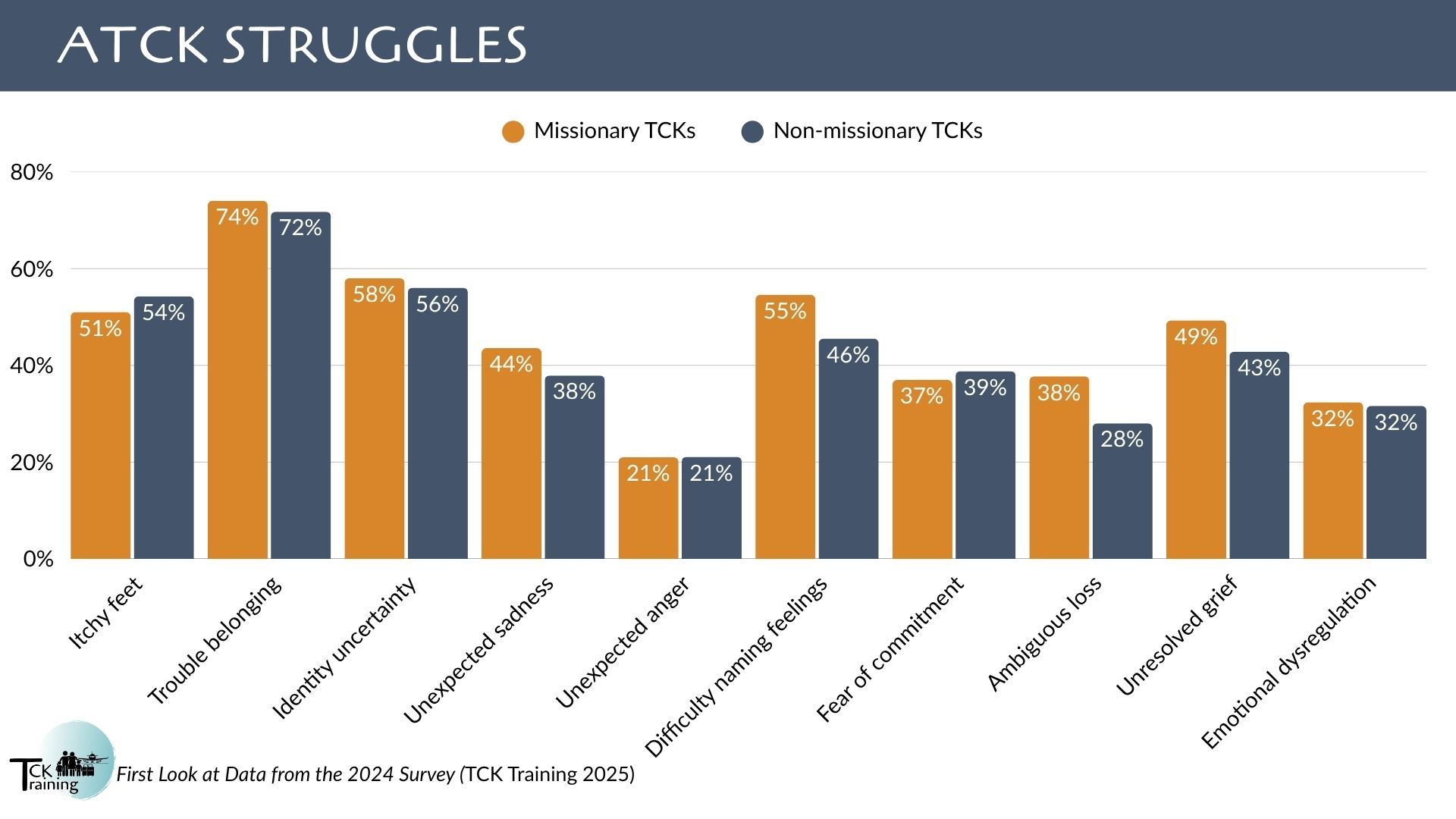
When we expect perfection in our TCKs’ behaviour, we may be unconsciously teaching them that they need to hide their emotions, that mistakes are inexcusable, and that it is only acceptable to express (or feel) positive emotions.
Mental Health
A range of questions were asked regarding experiences of mental health. This included discussions of childhood and adulthood experiences, what mental health care was available (and which was most helpful), screening questions developed in conjunction with several mental health professionals, and questions regarding formal medical diagnoses. We will begin here by looking at key symptoms of mental ill health reported by missionary TCKs through screening questions.
Mental Health Concerns in Missionary TCKs
34% of missionary TCKs said they experienced a “serious mental health crisis” during childhood. 86% of missionary TCKs surveyed had experienced symptoms of at least one mental health concern during their lifetime, and 3 in 5 had at least one formally diagnosed mental health condition. This is similar to what was seen in TCKs from other sectors.
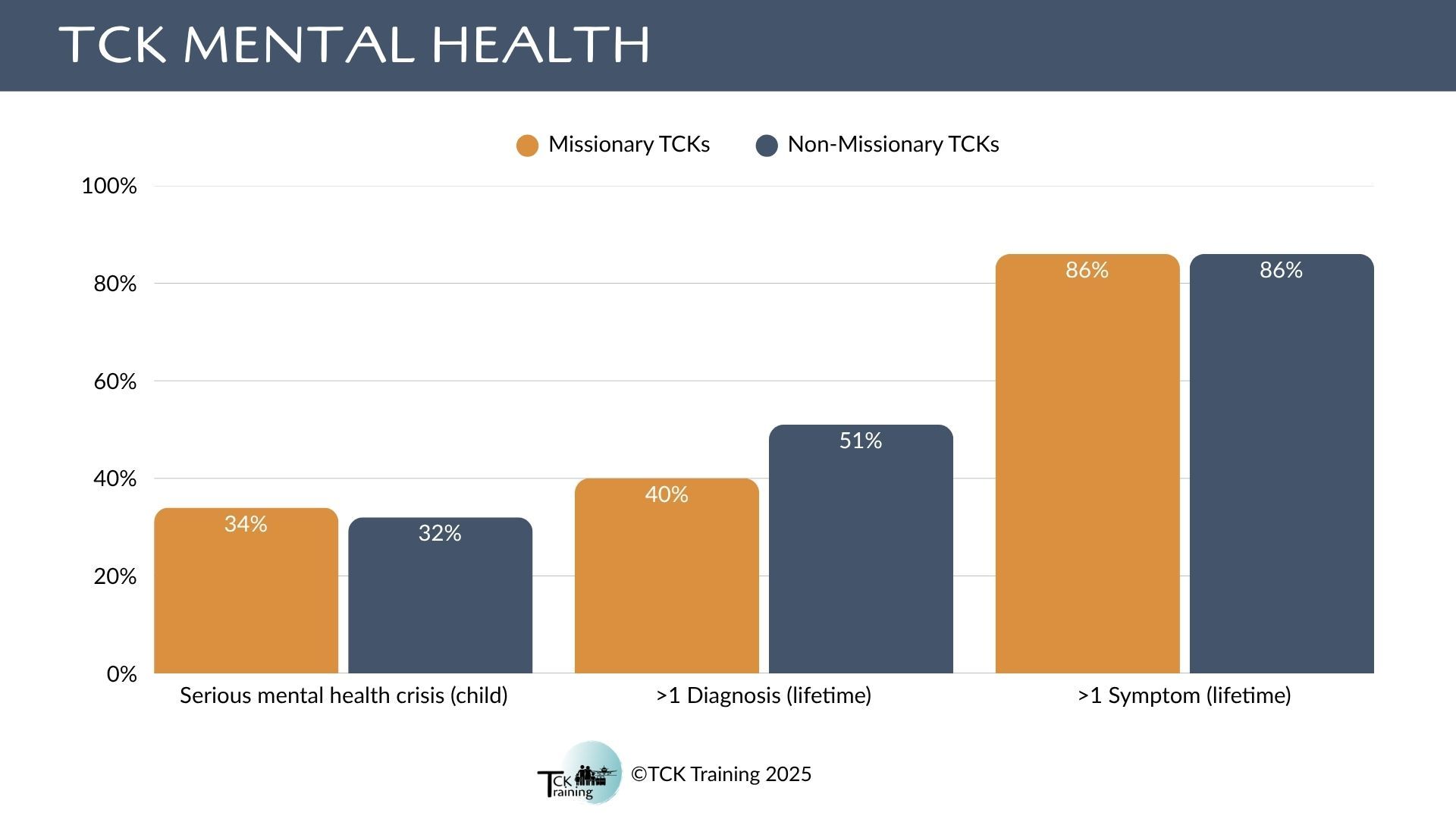
Symptoms of Mental Ill Health
A high percentage of missionary TCKs had experienced symptoms consistent with anxiety (58%), suicidal ideation (46%), and PTSD (47%). While most of this was consistent with the rates seen in other TCKs, missionary TCKs were a little more likely to experience symptoms of depression (59%) than other TCKs.
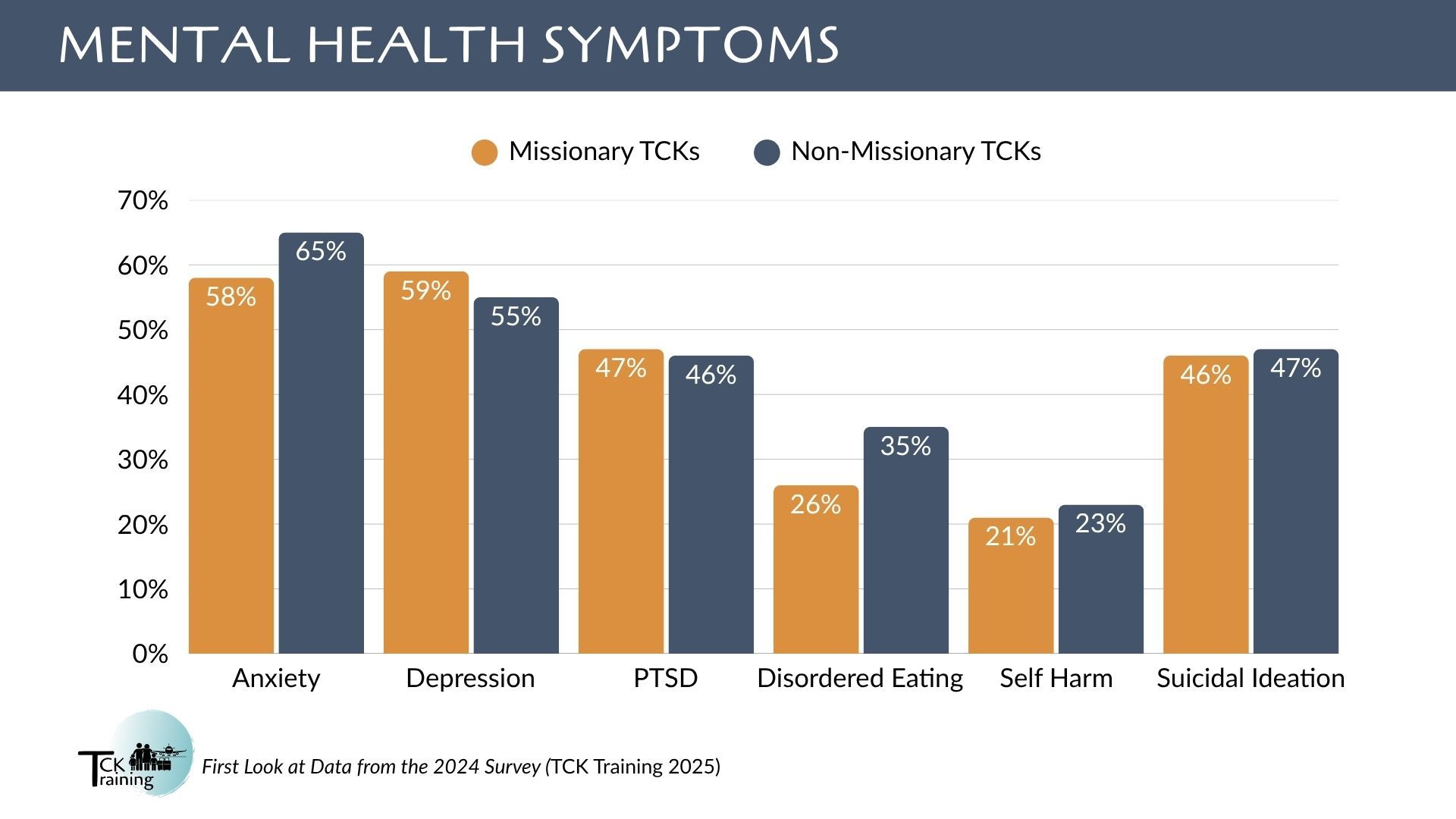
Diagnoses of Mental Health Conditions
Depression was the most commonly diagnosed condition among missionary TCKs. 40% of all missionary kids surveyed were diagnosed with depression, nearly a third (31%) with anxiety, and 23% of missionary TCKs had been diagnosed with panic attacks.
The lower diagnosis rates for other conditions, especially self harm and suicidal ideation, is not necessarily a good thing. 46% of missionary TCKs experienced suicidal ideation but only 12% received a diagnosis; 21% of MKs experienced self harm but only 4% received a diagnosis. More tools, resources and diagnostic methods need to be made more accessible for missionary families so that MKs get the intervention and support they need in a timely manner.
The lower diagnosis rates for other conditions, especially self harm and suicidal ideation, is not necessarily a good thing. 46% of missionary TCKs experienced suicidal ideation but only 12% received a diagnosis; 21% of MKs experienced self harm but only 4% received a diagnosis. More tools, resources and diagnostic methods need to be made more accessible for missionary families so that MKs get the intervention and support they need in a timely manner.
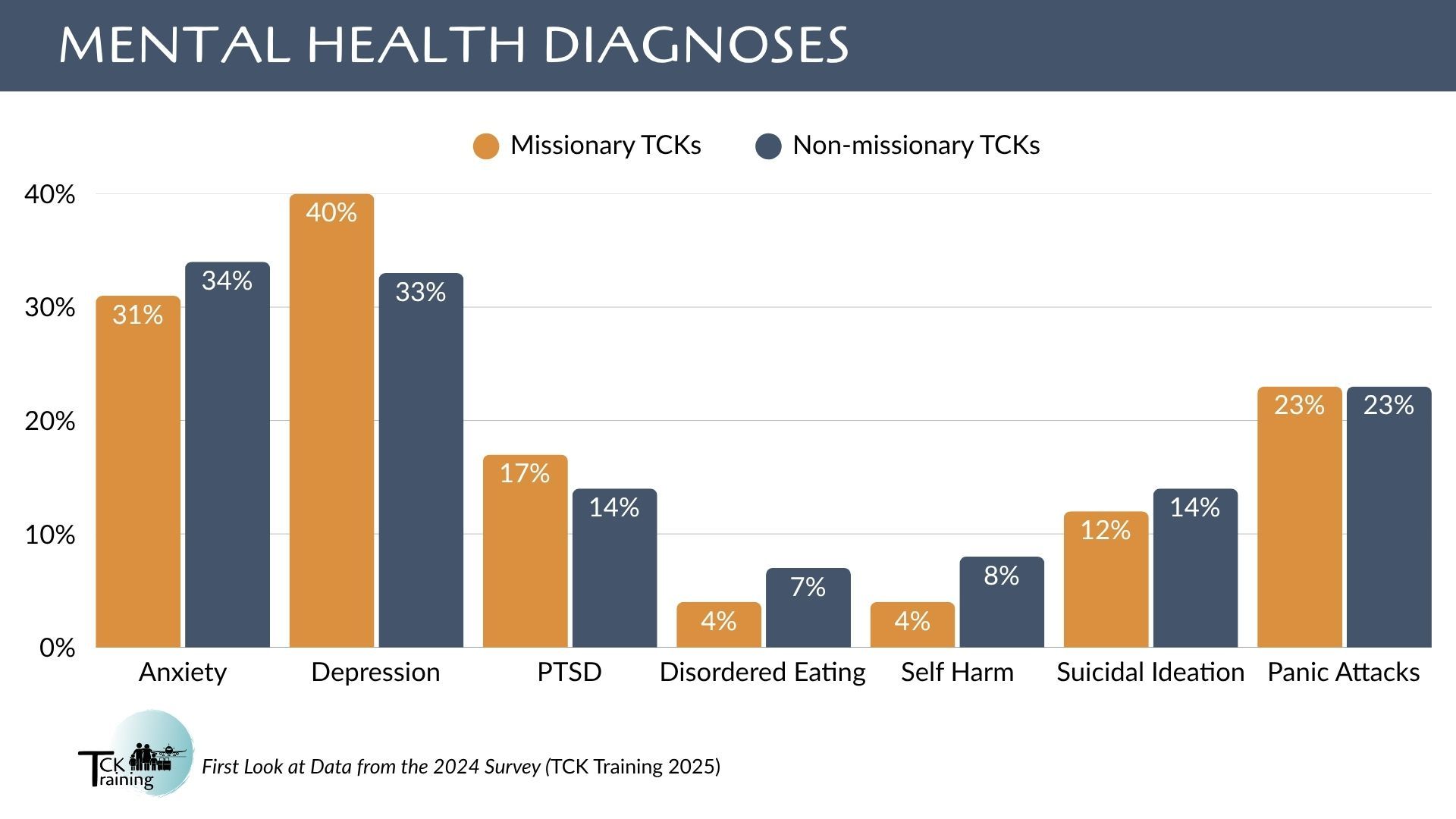
Previous research showed that a significant proportion of missionary TCKs grew up in homes where adults struggled with their own mental health. It is important that missionary families living internationally receive support to improve the mental health of parents and children alike.
TCKs who grew up in missionary families were four times more likely than American peers to experience emotional abuse. Our research also found that 2 out of every 5 missionary kids reported feeling neglected and 39% of missionary kids reported household adult mental illness.
Implementing Effective Support
This data reveals a complex picture of missionary TCKs’ globally mobile childhoods: both positive experiences of childhood overall, and difficult experiences with lasting impacts. Taking time to acknowledge this “ampersand life” – the both/and of the missionary kid experience – is important. As we do this, we ask the question: with this knowledge in hand, what can we do to provide empathetic and effective care for missionary families? The first step is simply acknowledging that the stress of international moves and cross-cultural living has a deep impact on families and the relationships between parents and children.
This data can seem pretty disheartening but there is hope found in strategies to mitigate the risks we’ve talked about. These challenges and risks are not unsolvable or reasons to despair, but rather reasons to take action in intentional ways that reflect the urgency of the matter. Globally mobile families are better able to meet their children’s needs when they are well supported by their sending agency and community.
Having acknowledged this difficulty, we can start reaching out for resources that will support missionary families. TCK Training is committed to providing tools and support systems that empower missionary kids and their families to thrive no matter where in the world they are.
Empty space, drag to resize
Leaders / Member Care
For Churches
For Missionary Parents
For Adult MKs
Related Articles
For Churches
The local church is also a key part of a missionary family’s support team. There are a lot of ways you can learn more about supporting missionary kids, too! This free booklet on Biblical Foundations for MK Care is a great place to start, as is this training on Churches Supporting Missionary Kids.
International churches caring for MKs in your congregation may appreciate the workshops Supporting TCKs in Your Community and Growing Supportive Intercultural Communities.
International churches caring for MKs in your congregation may appreciate the workshops Supporting TCKs in Your Community and Growing Supportive Intercultural Communities.
Most of the time I find that believers want to know how to support their missionary friends, but they simply don’t know how. I’ve spoken with believers around the world who’ve said they didn’t want to write too often and make their missionary friends homesick. They loved them dearly, but they just didn’t know how to transition to long distance support.
For Parents of Corporate TCKs
Parents can also build their own library of resources – both a literal library, and accessing online trainings that are designed for those raising children abroad. Workshops on Raising Thriving Kids Abroad and Discipling Missionary Kids are a great place to start!
TCK Training also offers a range of free resources to help families get started with tools to support their children through the stresses of international life.
TCK Training also offers a range of free resources to help families get started with tools to support their children through the stresses of international life.
We do not believe all the difficulties commonly observed in Adult TCKs, such as depression and anxiety, are inevitable. We believe that preventive care, begun when TCKs are young and implemented throughout their lives, can prevent the majority of these struggles. When all the stakeholders in a TCK’s life work together – parents, caregivers, educators, sending organizations – we can provide effective preventive care and set TCKs up for success and lifelong thriving.
For Adult Missionary Kids
Living abroad as a missionary kid comes with unique joys and struggles – and that’s okay! Acknowledging the both/and of this life helps. You can receive support directly – no matter how old you are, and how long ago you lived abroad. There are a range of Unstacking resources to help you process your experiences and how they’ve shaped you. There is the Unstacking book, coaching sessions, and a self-guided course. Or you might want to try a workshop on Navigating Christianity as an Adult Missionary Kid. Learn more about these and other resources here!
Helping Adult TCKs process their experiences, primarily by coaching them through the hard work of unstacking their Grief Tower, enables them to resolve suppressed grief that would otherwise be likely to trigger struggles such as depression and anxiety. The support that may have been absent during childhood is necessary for the Adult TCK’s processing journey, which is why we work hard to provide and share resources and support so they do not journey alone.
Missionary Leadership & Member Care Providers:
Care for missionaries and their families starts with missionary leadership. It is important that you are well informed and have access to the right resources for your team.
Member care teams are also an essential part of caring well for missionary families. There is a range of ways to be trained and certified to provide the best possible care for the families in your flock, such as Pathways, Groundwork, Debrief Certification and Unstacking Certification.
Member care teams are also an essential part of caring well for missionary families. There is a range of ways to be trained and certified to provide the best possible care for the families in your flock, such as Pathways, Groundwork, Debrief Certification and Unstacking Certification.
Families need education to understand not only the rewards but also the risks for international life. When a mission organization sends them abroad, that mission organization also bears responsibility for providing adequate information and effective support.
About the Authors
Carmen Dörwald is an ATCK with parents from Germany and Hong Kong. She spent her childhood in China and has lived in three countries (and counting) as an adult. She is a Research intern at TCK Training and creator of the blog/podcast How Did You Find Out?
Tanya Crossman grew up in Australia and the US before moving to China at age 21; she has worked with TCKs for 20 years. She is the Director of Research and International Education at TCK Training.
AT TCK TRAINING MARCH IS
Caregivers Appreciation Month!
See how YOU can celebrate
Free resources, giveaways, sales & more!
Free resources, giveaways, sales & more!



